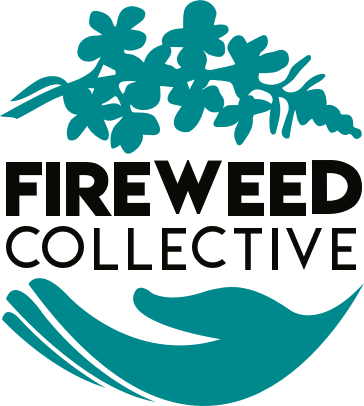Our Framework
Healing Justice (HJ) is a framework rooted in racial justice, disability justice, and economic justice. Healing Justice provides us with tools we can use to interrupt the systems of oppression that impact our mental health. Fireweed Collective uses HJ as a guide to help redefine what medicine is, and increase who has access to it.
We are honored to be a part of a larger community of organizations guided by the principles of Healing Justice:
- responding to and intervening in generational trauma and violence (Kindred)
- collective practices that can impact and transform the consequences of oppression (Kindred)
- imagining a generative and co-created future (Healing By Choice!)
- being in right relationship with ourselves, each other, and the land (Healing By Choice)
- centering disability justice, people of color, and economic justice (Leah Lakshmi Piepzna-Samarasinha’s history of healing justice)
We believe that in relationships we are hurt and in relationships we heal. While we don’t all need to become practitioners to heal, we must all do the internal and external work required to be in just relationship with ourselves, each other, in community, and with the land. This means confronting the dominant culture in the U.S. that enshrines individualism, ableism, patriarchy, capitalism, white supremacy, and settler colonialism. In this way, healing justice is cultural organizing, inside and outside of our movements. As Cara Page says, “Our movements themselves need to be healing or there is no point to them.” Fireweed is where folks come to connect these dots and access resources for healing ourselves, our communities, our organizations and movements, and our systems and institutions.
We act on these beliefs daily. Drawing from psychology of liberation, Fireweed strives to educate our communities on the impact of oppression in ourselves and in our relationships, to recover ancestral memory and medicine, to exalt the virtue of our people, to co-create healing tools and approaches, to foster healing spaces and relationships, and to act in ways that address both the long haul and the urgent and emergent needs of our people.
We are all learning together. Here’s the knowledge we’re grounded in right now:
Oppression makes us sick and healing from it requires centering those who are most impacted by it and supporting their blueprints for liberation. That means centering Black, Indigenous, and people of color, disabled and LGBTQIA+ people, immigrants, and low-income people. We make providing or participating in healing justice education financially and logistically accessible. Our webinars, workshops, and written resources draw from the lived experiences of diabled, poor, immigrant, young, and LGBTQ folks.
Liberation comes from place-based leadership by impacted folks and requires radical and systemic changes. It is possible to create liberated spaces where we can learn together and practice freedom. We can’t do it all as individuals, but together we can do a lot, if we learn to work relationally, to see each other as human instead of as machines or transactions. We can all contribute to co-creating cultures that are supportive and healing (peer support). We have everything it takes to create just environments that foster and promote healing. Fireweed Collective amplifies practitioners and facilitators who belong to impacted communities and who come from traditions which historically recognize the link between oppression, trauma, and mental health
Intergenerational trauma is real. Trauma creates changes in the body that are transmitted from generation to generation. These changes can be reversed or addressed by changing the environment. The scientific field where much of this learning takes place is called epigenetics. But our ancestors are so much more than trauma. They have passed down to us love, joy, resistance, and resiliency, and hold medicine for us — all the good in us comes from them too. Our work involves finding and surfacing all the tools that live in our lineage.
Trauma is complex, and not all trauma is traumatizing. The level of traumatization is not relative to the magnitude of the trauma, but to the social and emotional support in the aftermath of the traumatic event. Support includes a strong cultural identity, nurturing close relationships, and safe access to housing, food, and healthcare. When we show up for each other, we protect each other and our communities from the effects of traumatization. We create resources for emotional mutual aid and hold peer support spaces.
Feelings and emotions are part of the human experience. There are no bad feelings and emotions, only problematic outlets. We don’t strive for perpetual happiness — that’s an unrealistic and controlling idea. Instead we work in supporting each other to move through intense emotions in ways that minimizes or avoids harm to self or others. We explore ways to plan for crises such as creating emotional safety plans, building emotional safety teams, and promoting emotional justice in the workspace.
Healing requires self-determination and can take many forms. Healing involves informed choices about risk and risk management (harm reduction). There is no one modality to healing. Healing can be playful and joyful, it can be hard and painful. We accept that people have a right to choose the modalities that meet their needs. We welcome people whether they use mental health labels or not, choose to use meds or not, and we support their paths to self determined wellbeing.
Crisis requires us to act swiftly. We need to act upon circumstances as they arise, so we don’t leave anybody behind. This includes a Crisis Toolkit and regular community-led rapid response and emotional first aid offerings. If you or someone you love is in crisis please direct them to the Crisis Toolkit.
Resources
A Not-So-Brief Personal History of the Healing Justice Movement, 2010–2016, Leah Lakshmi Piepzna-Samarasinha
Healing Justice As Cultural Organizing, Kifu Faruq
8 practices for a more emotionally just organization, Agustina Vidal
Healing Justice: Building Power, Transforming Movements, Astrea Foundation
National Queer and Trans Therapists of Color Network (NQTTCN)
BEAM (The Black Emotional and Mental Health Collective)
Autistic Self Advocacy Network
